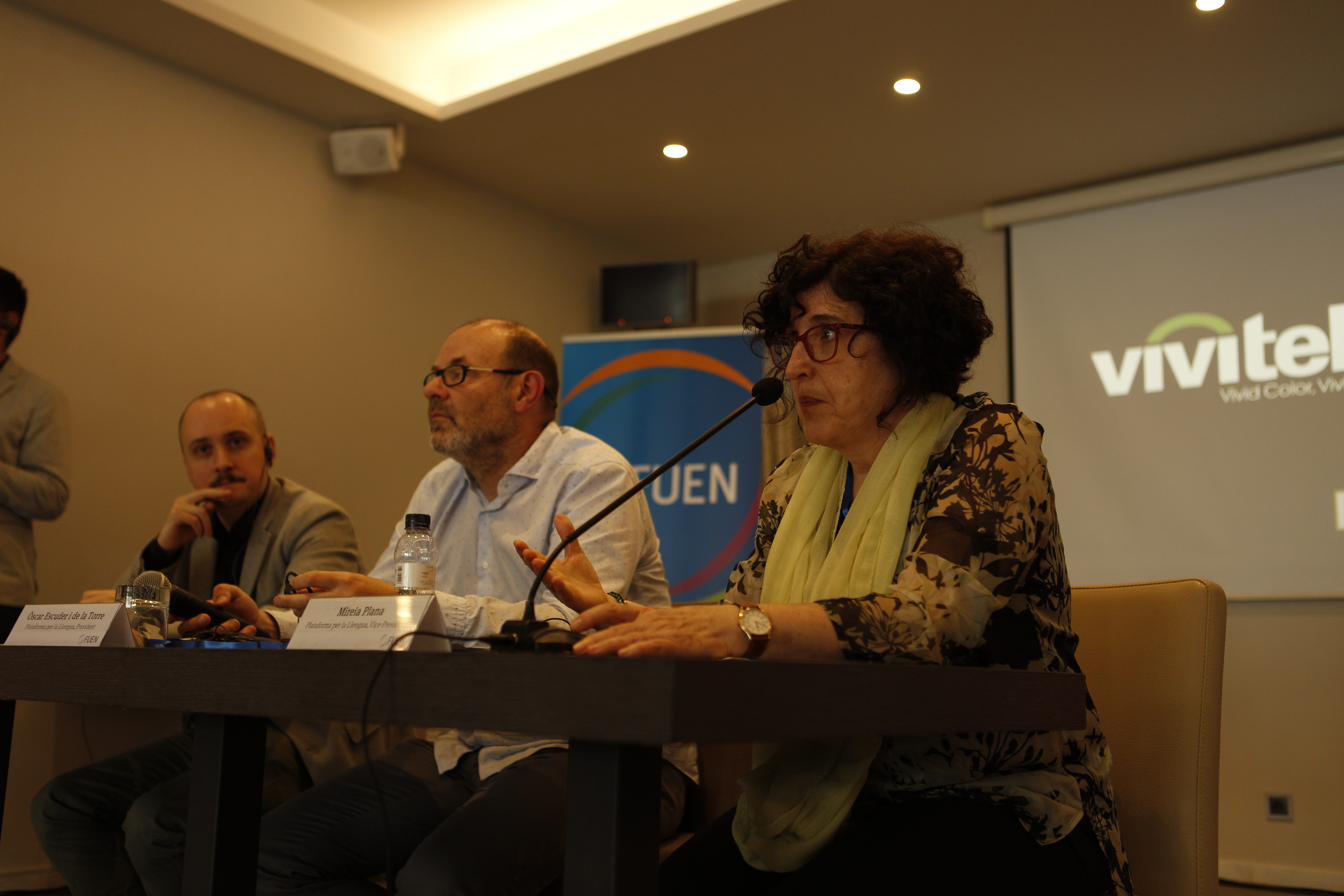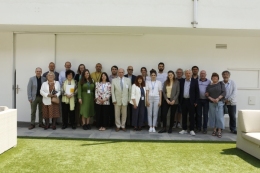The Non-Kin-State working group of the Federal Union of European Nationalities (FUEN) was held at Altafulla on Thursday and Friday, 1 and 2 June. Taking part for the host organisation, Plataforma per la Llengua, were its president, Òscar Escuder; the vice-president, Mireia Plana; the head of the international department, Òscar-Adrià Ibáñez; the international officer, Maria de Lluc Muñoz; and the law, consumer affairs and public administration officer, Miquel Gil.
At the beginning of the meeting, Òscar Escuder told the guests about the purpose of the organisation, how it works and its main current campaigns. Mireia Plana made a sociolinguistic presentation on the Catalan language and its position in the world. And Miquel Gil reviewed the history of Catalan and the Catalans.
Mireia Plana also took part in the closure of the first working session on the training of public-sector workers in minoritised languages, led by Meritxell Llorente, head of the Language Planning Operational Area of the Catalan Government's Department of Business and Employment. Llorente explained the training system for public-sector workers in Catalonia and Alma Hidalgo, creator of YouTube videos in Asturian and member of Iniciativa pol Asturianu set out the situation in Asturias. Also taking part was Paul Bilbao de Kontseilua (Basque Country), who spoke of the Basque model of language profiles and the deadlines for achieving them.
The working group on Good Practices in Language Training for Public Employees in Minority or Minoritised Languages was opened by the philologist, teacher and activist for the Catalan language Teresa Casals, who explained how the teachers who had taught in Spanish during Francoism prepared to start teaching in Catalan. Also taking part in this talk was Carlos Vieito, member of the executive committee of the Galician organisation A Mesa Pola Normalización Lingüística, who talked about the initiatives to promote the use of Galician by Ames Municipal Council in Galicia.
The second day of the meeting began with the working group The Presence of Minority or Minoritised Languages in New Technologies. Àlex Hinojo, digital coordinator at the Ramon Llull Institute, talked about Catalan in new technologies and how minorities have to make the most of artificial intelligence to increase their online presence. This talk led to a rich debate in which various members of FUEN asked questions about how to transfer these ideas to their communities. The second part of the talk was by Carlos Vieito, who explained the struggle to secure a presence for Galician on the Internet and on social media.

The event continued with the working session Social Media Content in Minority or Minoritised Languages. The sociolinguist Marina Massaguer and Montse Sendra, a researcher for the Centre for Sociolinguistic and Communication Research (CUSC) and lecturer at the University of Barcelona, presented their study on the presence of Catalan on social media and spoke of the creation and consumption of Catalan content on these networks. Alma Hidalgo also spoke on this last topic, specifically about how Asturians have created communities and spaces to promote the creation of content in Asturian not merely related to folklore, but on all kinds of subjects. Finally, Paul Bilbao also set out the Basque case, emphasising the presence of Basque on digital platforms like Netflix, HBO and PrimeVideo.
Finally, each participant in FUEN gave a brief introduction to their minority and the projects they are working on now.
Apart from the different working sessions, the members who took part in the meeting were able to enjoy different cultural tourism activities, such as a visit to Tarragona to discover the city's Roman archaeological heritage. They also visited the gipsy community of the higher part of Tarragona. There was also time for a tour of Altafulla with the Altafulla Study Centre to discover the history of the town and its most outstanding buildings. To round off their visit, participants in the meeting were able to attend and participate in a practice session by Altafulla's Castellers (human towers).
The conclusions of this working meeting will be passed on to the vice-president of FUEN responsible for the group, Bahne Bahnsen, at the next FUEN congress, which will be held in September in Pécs/Fünfkirchen, a Hungarian city with a German-speaking minority.




